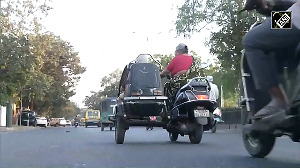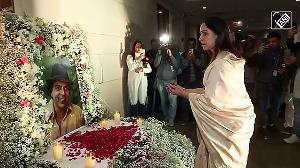Fifty-eight years after independence, Indian women still toil daily to collect fuel wood, crop residues, and animal dung -- together known variously as biomass-based cooking fuels, non-commercial fuels or traditional fuels.
These fuels still provide 80-90 per cent of the energy needs in rural areas. While one part of our society is taking strides in nuclear science, space research, and information technology, there is little impact of that on the lives of women, who live in virtually 16th century conditions. Is providing clean fuels such a formidable problem, or do we not care?
The 2001 census finds nearly 700 million people without access to modern energy. Nearly 300 million people do not have access to electricity, but what is more, an even larger number, viz. 625 million do not have access to modern (cooking) fuels.
Why should that be so when it takes more investment, management, and technology skills to provide electricity than modern fuels? Partly, it is because the trained engineers supported by the ministry of power and the governments found political support to carry out this difficult mission.
Moreover, men, and perhaps women too, demanded it. In contrast, this "other energy system", one-third of India's total energy, is "managed" mostly by women with too little inputs of investment, management or technology and no political or administrative backing. Can we help these women energy suppliers or "managers" without taking this role away from them but instead provide them IMT and improve their lives?
A recent study by the Integrated Research and Action for Development showed that in Himachal Pradesh, a better off state with more penetration of LPG and kerosene, women walk 30 km every month, spending a great deal of time during 15 trips, each of about 2 km, to fetch fuels.
This burden, which is bigger in other states, causes backache (50 per cent), neckache, and headache and bruises every week (80 per cent) and most of the women have encounters with wild animals and snakes every quarter.
These statistics are hard to come by and we had to collect it. Health and other problems associated with "searching, gathering and transporting" have received much less attention than the problems from cooking with them.
Cooking using these fuels causes health impact, especially for women and children, because they emit a variety of pollutants in their close proximity often in poorly ventilated kitchens. It has been estimated by us that 19 per cent of people in Himachal have some symptoms.
Can we at least see this as an economic problem, if not a health problem, or a drudgery problem? Nearly 3 billion days are spent in gathering fuels and 700 million days in processing them, i.e. chopping, drying, turning, storing, stacking and handling.
About 800 million days are lost due to diseases. Add to these 12 billion days on fetching water and water-related diseases. What economic value can we put on 16.5 billion days? None, same sceptics may say. Can a nation continue to achieve 8 per cent economic growth if this is how billions of hours are spent by nearly 30-40 per cent of its population?
These problems have to be addressed if we are to achieve the Millennium Development Goals of eradicating poverty and hunger (energy is needed for cooking and livelihoods), achieve universal primary education (girls often do not go to school because they help their mothers at home), reduce infant mortality and maternal deaths (heavy loads and
indoor pollution add to this health burden), promote gender equality and
empower women.
What can be done?
IRADe has suggested that to start with, India needs a political commitment to set a goal. For example, biomass should be easily available within 1 km of any village. Alternatively, kerosene or LPG should be available within reasonable proximity.
A mission similar to the 'Rajiv Gandhi Mission for Drinking Water', which tried to bring water within 1 km in rural areas after many years of work, needs to be undertaken for bringing fuels closer to people.
For example, women's groups can form tree-growing co-operatives for fuel wood or oilseeds plantations with the same efforts that they put in searching and gathering fuelwood to develop sustainable energy supply.
They can determine which energy sources such as wood, agricultural residues, animal dung, oilseeds, solar, biogas, LPG, or kerosene could be available at least cost and effort. After examining this, user groups can also identify land and the type of plantation (e.g. wood, oilseeds, agriculture) that will serve the purpose. The involvement of panchayats
and other local bodies is necessary to provide an enabling policy environment.
Even transportation problems can be addressed in a systematic manner, if the supply is located in one place. A policy can be formulated to accommodate such a programme under various existing poverty alleviation schemes, including the new employment guarantee and other Bharat Nirman schemes.
One needs to go beyond cooking energy and extend the scope to income-generating or livelihood activities. Both rural and urban women need adequate energy supplies for their small- and medium-scale enterprises and home industries. Many of these informal sector
activities are highly fuel-intensive, and their viability and costs are affected by energy prices and availabilities.
Examples of energy-sensitive micro enterprises by women include food-processing industries such as oil milling, flour milling, cleaning, grading and packaging of agricultural produce; kitchen gardens; charcoal making; kiln using; and manufacturing activities. Because fuel is a significant cost factor, there is a commercial motivation to improve the efficiency of the entire process.
A paradigm shift is also necessary to change from a "subsidy mindset" to micro credits and loans. The aim should be to use self-help groups for micro-enterprise development that may be by either users of energy or suppliers or both.
Women as energy providers can form suitable micro enterprises if they are able to manage fuel wood or oilseeds plantations, dispense kerosene or LPG, assemble solar panels, build cook stoves to brick kilns and even manage electricity distribution and bill collection.
New opportunities for sustainable technologies can be availed of with necessary resources to allow them to participate in the formulation and implementation of energy programmes and policies.
"Indhan, pani, bijlee" should be given political priority instead of only "electricity-water". It is surprising that in a democratic set-up women have not yet asserted themselves on this issue. Are they too busy collecting wood, or too remote to vote, or not aware that their lives can be different, and have they accepted it as fate?
In all of the above cases, democracy has failed them. We hope for their awakening so that the next election could mean the beginning of the end to lifelong drudgery. But before that, hopefully the current government will also address this problem of "Aam Aurat".
The author is executive director of Integrated Research and Action for Development.






